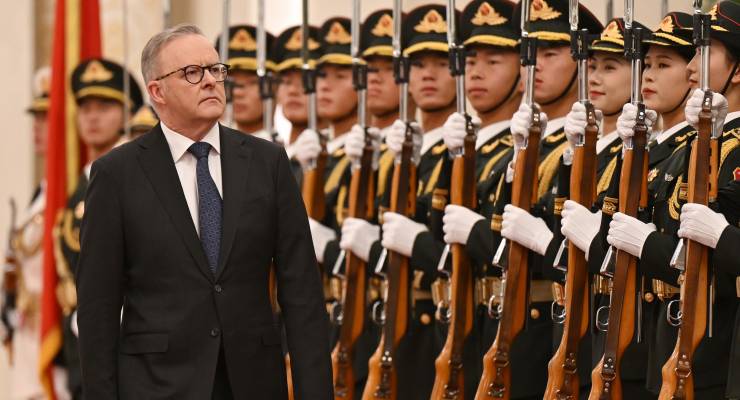
There is one clear message from Prime Minister Anthony Albanese’s recent visit to China: he wants to restore the legitimacy — even dignity — of economic prosperity as a trope. He’s telling Australians that businesspeople aiming to make a profit from doing business with China are acting in the national interest and are not, in the words of one journalist, “craven characters” who risk the nation’s sovereignty.
The business community — particularly those in the beef, wine, barley, seafood and other export sectors — have suffered from the deteriorating relationship between Australia and China. Yet during the era of the Morrison government, the business sector’s criticisms of the China-threat narratives that dominated media and government pronouncements were mostly muted. Few dared to speak up, not wanting to be accused of putting economic interests above national security. Who wants to be cast as a “craven character”?
A study of the content of current affairs programs about China on the ABC and SBS between 2005 and 2008 suggests that Australian media coverage adopted two parallel but independent tropes: economic opportunity and geopolitical threat. In more recent years, however, these tropes have been yoked to form an overarching China-threat narrative, which, according to some international relations scholars, marks the “securitisation” of Australia’s public discourse.
In other words, since 2015 or 2016, China has become a source of threat, not in spite of but precisely because of our overreliance on it for our economic prosperity. Opportunity has become a security liability.
Albanese stayed close to his script while talking to the media during his China visit. He repeated Labor’s new China policy mantra almost like a ritualistic incantation. The first part of the mantra — we will “cooperate where we can, disagree where we must” — seems to suggest that Labor has finally figured out a one-size-fits-all formula for dealing with China. But the second part – “We will engage in the national interest” — suggests that this is not the case.
This is because, despite the repeated utterances of these sentences by Labor leaders, there has never been a clear definition of what constitutes our national interest in relation to China.
Writing at the end of last year, Albanese said: “It is clearly in Australia’s best economic interests to be able to export our high-quality barley, wine, meat, seafood, resources and more to China.” However, he went on to quote Foreign Affairs Minister Penny Wong as saying: “We can grow our bilateral relationship alongside [emphasis added] upholding our national interests if both countries navigate our differences wisely.”
The wording of the mantra changes slightly each time it is uttered. In her speech to the National Press Club, Wong said that the Albanese government will ”cooperate where we can, disagree where we must, manage our differences wisely, and above all else, engage in and vigorously pursue our own national interest”. Elsewhere, she is reported by various media outlets to have said that “Labor would seek cooperation while fiercely protecting Australia’s national interests”.
There are at least three ways of reading these statements. The first is that economic prosperity and national security are both essential components of our national interest. The second is that, while both national security and economic prosperity are essential, the former trumps the latter. The third is that trade with China is good because it’s crucial to our economic prosperity, but such trade is not necessarily a part of Australia’s national interest, and that we will not compromise on national security for the sake of economic gain.
One has to admit that the choice of words here is a clever manoeuvre: first, the rhetoric is acceptable to China; second, it placates Australia’s China hawks; third, it shuts up the opposition. Moreover, the ambiguity in language leaves the government with plenty of wiggle room.
But the slippery language betrays an inability to resolve an underlying tension between economic prosperity and national security when it comes to dealing with China. And language, clever as it may be, is not the same as effective strategy, and certainly not the solution.
And this ambiguity means that tricky issues — such as Chinese investment in Australia, growing tech competition between the US and China, the issues of Taiwan and the South China Sea, AUKUS, cybersecurity, etc — which no doubt will come up repeatedly in future, will pose much the same challenges as before.
Perhaps the most contradictory aspect of the government’s policy is encapsulated in another statement made by Albanese during his visit to China. He said trading with China helps us strengthen our economy, and a strong economy “sets our nation up for a safe and a prosperous future”.
A positive interpretation of that would be to say that, unlike the Morrison government, Labor has found a way of walking a tightrope in dealing with its respective relationships with the US and China. By contrast, a cynical response would be to say — as a Sydney-based businessman did recently in a WeChat group dedicated to the discussion of Australian politics — that “Australia can make money by trading with China, and then use this money to buy submarines from America, in case China invades”.
While duly reporting on Albanese’s iteration of Labor’s “new” formula, few of the news stories on his visit to China took the opportunity to ask experts to comment on the implications and politics of the subtle shift in Labor’s deployment of the “national interest” rhetoric. Nor did they delve into the ongoing existential conundrum that this ambiguous language masks.
It seems the average Australian is most likely to be none the wiser about the key challenges lying ahead in Australia-China relations.
For instance, rather than asking experts whether they are pessimistic or optimistic about the future of the bilateral relationship, or whether they think the relationship will go “back to normal”, perhaps they could ask some more in-depth questions.
For instance: how will the differences between Labor’s left and right factions in relation to the definition of “national interest” be played out in future disagreements between Australia and China? Or perhaps: both Labor and the Coalition use “the national interest” as a means of justifying their policies and actions in relation to China, so in what respects is Labor different from the Coalition in its geopolitical positioning vis-à-vis China, apart from adopting a quieter diplomacy posture and calmer rhetoric?
So it seems Labor’s new mantra masks an existential conundrum.
“No,” you may retort. “You’re splitting hairs. It’s all semantics.” But is it?
Do you feel safer with the warming Australia-China relationship? Let us know by writing to letters@crikey.com.au. Please include your full name to be considered for publication. We reserve the right to edit for length and clarity.








China is the industrial powerhouse of the world, why wouldn’t we be more than happy to sell them as much raw material and foodstuffs as we can spare. Given we don’t actually make much anymore because we swallowed the neo-liberal economic efficiency shtick that would seem to be in the National Interest surely.
The idea that we are going to travel half way around the world to attack our largest trading partner, largest industrial power and the most populous country in the world is just an American think tank’s wet dream. Any rational person can figure out how that will end, so why are we even contemplating that let alone hosing untold $billions against the wall on nuclear attack submarines.
As for the things that exercise us, like our supposed concern for the Uyghurs we don’t give a rats really do we? What about our indefinitely detained without charge political prisoners (asylum seekers under international law), what are we doing about the Rohingya, what are we doing about the Kurds, the Palestinians, the Amazonian tribes? just hypocritical BS. Cybersecurity, …. China is responsible for the most industrial espionage or hacking attacks in Australia, but of course the Five Eyes wouldn’t do anything like that would we, … Nooo. And the South China Sea, how dare China make it difficult for the Americans to blockage them, and prevent the raw materials they are buying off us and the gee-gaws they send back to us from getting through.
All are tropes that are just media talking points that not even worth engaging in but perhaps the Labour Party have worked out that really it is in our National Interest to just shut the ….. up!
Yes, and a very dangerous wet dream. The US couldn’t beat China when all China had was trucks and rifles. Just another US weapons-testing exercise with no credible military or strategic objective.
People such as politicians and reporters should shut up or put up. Tell us what exactly is the threat against us. Missiles? Invasion? Sabotage? The domino theory? Cheap air fares? Crying wolf becomes very stale and tired after constant repetition. 50 years ago we even went to war for this, killed untold poor Vietnamese, lost the war and guess what? Nothing happened. Inventing a threat is the oldest trick in the book to rake up fear and loathing – pathetic. I suppose it gets traction every 50 years or so as people forget. But should anyone want to know what happens in a war take a look at Gaza today. The biggest threat against our security and national interest is AUKUS. We don’t need napalm, cluster bombs, agent orange, nuclear weapons and nuclear submarines (all invented by the USA). All we need is profitable trade and cordial relations at all levels.
There’s a pink lake up the road here (who knew) where Chinese couples come to get married, lots of them. My mother went to have a squiz at the Great Wall of China. So people who have an agenda to wreck all that with some rubbish bs should f off. IMO. They’re a threat to national interest and security.
Would you believe Mum got on the wrong plane and ended up in Moscow as an illegral immigrant, before the wall came down. Those nasty communists could have chucked her in prison without trial, indefinitely, the way I’ve heard some countries do, but they gave her a cup of tea, a biscuit and a seat on the next plane home. Just saying.
Calm down. The threat is not war, but using trade bans to get a political outcome, spying on Australians of Chinese background, hostage diplomacy etc. But I agree about AUKUS – I hope it doesn’t happen.
Don’t know if you read the comments Wanning – but in case you do, it would be interesting to know how you think New Zealand manages to navigate this US/China balancing act.
They don’t seem to be caught up in the same media hype and brutal political point scoring as we are here in Oz.
And the rest of the world, including US, but Australia during the LNP’s term decided upon an obsessive antagonising of China (inc RW MSM ‘journalists’) for electoral agitprop and good old nativism targeting low info &/or info many older nativist leaning voters aka ‘yellow peril’.
The latest NZ Defence Strategic Review specifically acknowledged that they would need to increased their defence commitments fairly substantially due to the strategic risk posted by China.
Admittedly…that’s upgrading their capabilities from “none” to “some”
Xi just hosted Albo and now Xi is off to San Fran to meet Jo. Hardly the actions of actors that are at threat of going to war with each other. Drummed up fluff to keep the military industry pumping. Any disputes will be worked out behind closed doors. War’s not good for business but the belief in it is great for business.
Albanese briefing notes 2023 DFAT